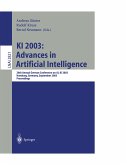

Broschiertes Buch
26th Annual German Conference on AI, KI 2003, Hamburg, Germany, September 15-18, 2003, Proceedings
2003
9. September 2003
Springer / Springer Berlin Heidelberg / Springer, Berlin
978-3-540-20059-8
| eBook, PDF | 73,95 € |
Ähnlichkeitssuche: Fact®Finder von OMIKRON
